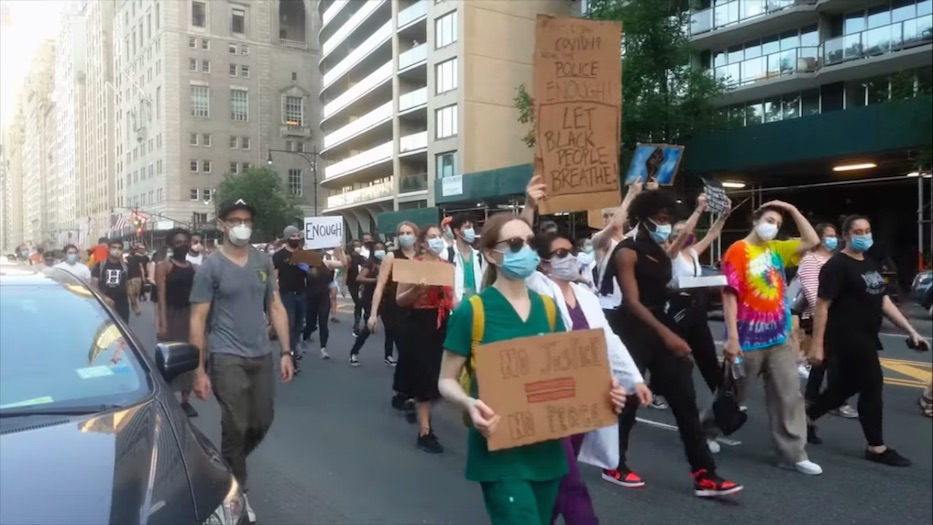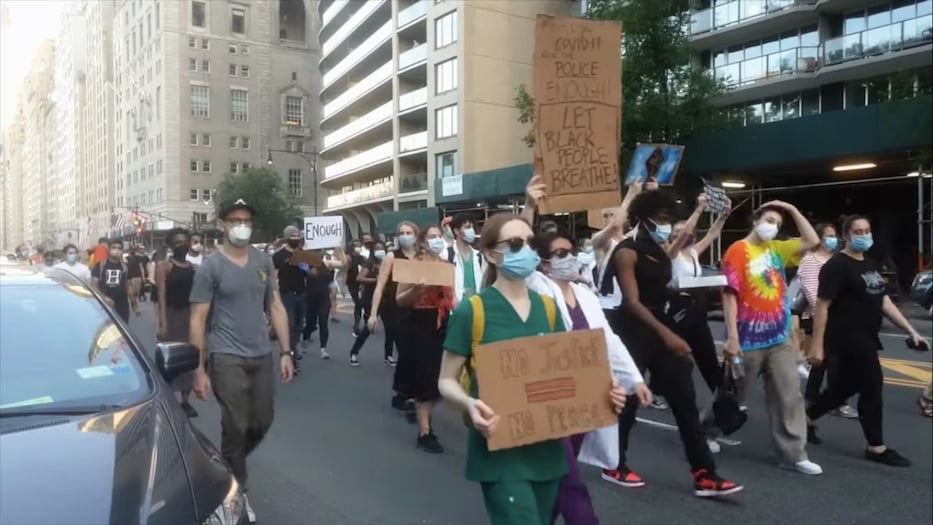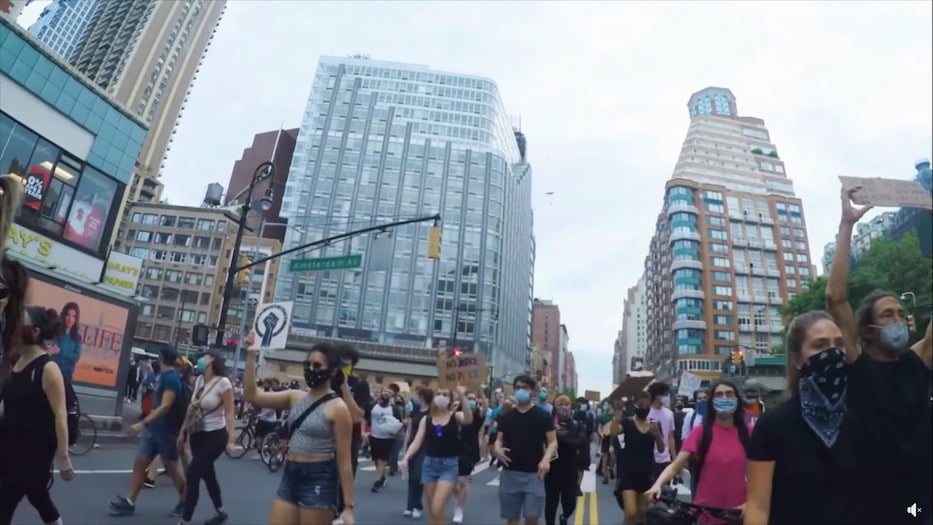
Education & Youth | Arts & Culture | Musicians | Connecticut | Arts & Anti-racism | Education
 A screen shot from Melanie Cometa's video, the final version of which is embedded below.
A screen shot from Melanie Cometa's video, the final version of which is embedded below.
The words are clear, succinct and sweeping as they travel across space. You gotta put one foot in front of the other/And lead with love. A flurry of feet slowly make their way across the screen. One foot in front of the other/And lead with love. As a soloist emerges, the scene turns to cartoon characters holding the words, then more feet, then stock footage from protests, putting singers in time with the beat of resistance.
It almost didn’t make it into public view.
That’s the story behind a 2021 Connecticut All-State Choir video that the Connecticut Music Educators Association released last Tuesday afternoon, after a months-long battle with all-state chairs, cohort leaders, choral directors, educators and CMEA leadership that remained largely out of public view until last week. On Nov. 12, a group of CMEA educators went public with allegations of censorship, silencing, and entrenched racism at the organization.
In a statement posted to Facebook and shared on Google Drive (read it as a PDF here), they said that CMEA leadership asked them to remove video footage of signs that read “Black Lives Matter” and “Let Black People Breathe” before releasing the video. When educators refused—on the grounds that they believe that Black lives, in fact, do matter—CMEA refused to make the video public. For over four months, the work of 300 students and several educators remained private.
CMEA Director Barbara Skrebutenas declined to comment for this story. She instead directed the Arts Paper to a statement posted to Facebook by then-CMEA Board President Jason Bouchard that “CMEA is 100 percent committed to racial justice” and that “we do not believe that we are taking a political position.” Read the full statement, delivered as a status update on Facebook, here. On Friday morning, Bouchard resigned from his position amidst state- and nationwide calls for him to do so.
“I am glad that this video is out,” said Melanie Cometa, who edited the video and served as an all-state cohort leader earlier this year. “I am sad about the manner in which it took for this video to get out, but I think the silver lining is that this has put a national call out for us to really examine the content and the meaning of our choral experience.”
The story of the video begins earlier this year, as the ongoing Covid-19 pandemic made it clear that this year’s Connecticut All-State Choir would have to brave the virtual pivot. In the spring, CMEA contracted with educators Tesfa Wondemagegnehu, assistant professor of music at St. Olaf College and co-founder of the Justice Choir Movement, as well as Professor Jeffrey Douma out of Yale University. Before students came onboard, CMEA approved use of the Justice Choir Songbook, from which students later rehearsed and sang two selections.
Matthew Harrison, who served as one of four Connecticut All-State Choral chairs, said that 300 students made it into this year’s choir after auditions. Over two days this spring, students met virtually, separated out into breakout rooms with facilitators. They spoke about the history of singing and social justice. They talked about what they were seeing and experiencing as the world flipped on its head, and song made its way into the streets. For Harrison, as well as for many of the students, it was personal—many attended rallies and protests and spoke out against the state-sanctioned murder of unarmed Black people last year.
“It's important that we're not proselytizing to our students, but giving them a platform to learn about these issues and talk about these issues,” said Harrison, who is president of the Connecticut American Choral Directors Association and a vocal music teacher at Hamden Hall Country Day School. “I say often, I don't teach music. I teach people. We had a really special platform to talk about issues to encourage civil discourse. We had educators, cohort leaders, we broke out into smaller sections so we could have conversations led and facilitated by teachers.”
Originally, he said, CMEA leadership was excited for the project and video. After students prepared during the two-day intensive, they recorded the music in their homes—mostly on their phones, said Harrison—and then sent it in to Harrison. After he worked on edits, he sent it on to Somerville-based Plaid Productions and then to Bill Hare, a Grammy-winning producer based in California.
All-state chairs brought in Cometa to put together a video because “we didn’t want a bunch of Brady Bunch heads,” Harrison said, referring to the now thousands of pandemic videos with tiny squares of people singing. CMEA signed off on her work. When she finished the project in July, she sent it back to CMEA leadership for final approval.
That’s when things started to go awry, said Amanda Hanzlik, choral director at E.O.Smith High School in Storrs, who also served as a 2021-22 all-state choral chair. In a phone call Monday, she remembered the board telling her “we love the video, please remove any images of Breonna Taylor because it's an ongoing investigation because we can't take sides.” At the time, the request seemed reasonable enough, she said. Cometa made the edit, and resubmitted the video.
Then after a second round of edits, the board called for the removal of two signs, both of which appear in the choir’s first number, activist Melanie DeMore's "One Foot/Lead with Love." The first, barely visible unless a viewer looked for it, read “Black Lives Matter.” The second read “Let Black People Breathe.”
Hanzlik remembered feeling outraged. From her point of view, the signs—already hard to spot in the footage of marchers—asked for basic human rights. To her, they dovetailed with a long and storied history of singing and social justice on which the year’s entire curriculum was built.
“I thought, No! We're not gonna do that!” she recalled in a phone call. “The board president, he kept saying, ‘This is a political ideology. We cannot align ourselves with a political statement.’ He kept saying, ‘I want this thing to be released, but people are going to see this and they're going to be upset about this.’”
Harrison, Hanzlik, and fellow all-state chairs Theresa Voss and Stephanie Zak refused to make the edit. They stood beside Cometa, who also served as an all-state leader this year. There were weeks more of silence, Hanzlik recalled. Then late in the summer, the board got back to all-state chairs, claiming that they needed students’ permission slips to release the video. When teachers pushed back again, Bouchard then wrote that leadership had, in fact, never signed off on the video in the first place.
“It was produced without permission or knowledge of the Equity and Advocacy Committee, Student Affairs Commission, and the Executive Board of CMEA,” he wrote in a letter to CMEA members obtained by the Arts Paper earlier this month. Hanzlik, who has been a member of the NAfME for 22 years and CMEA for 12, was floored.

A screen shot from Melanie Cometa's video.
“The ED tried to say, ‘We didn't know about the video,’ and we said, ‘No, you did.’ It was budgeted. You paid the videographer. I sent a request to the director for imagery for past all-states,” she recalled. “She said, ‘Well we did know, there would be a video, but we didn't know it would be content like this.’ And in that moment, I just cracked. I could not believe what was happening.”
For Harrison, who marched in Black Lives Matter rallies in Hamden and New Haven last summer, it came as a shock to the system. He had watched CMEA leadership approve the conductors, the music, the sound mixing, the contract with Cometa and the video editing process. And now, the work of 300 students—and their families, friends, and teachers who wanted to hear it—hung in the balance.
“They paid for the music. They paid for the clinicians to come in. We had breakout rooms and we talked about what this language means,” he said of CMEA. He recalled watching CMEA leadership come to the virtual meeting, and drop in on the breakout rooms to hear student conversations.
The eight all-state chairs and leaders decided that “as a team, all of us, that we weren't going to let this go,” Hanzlik said. They wrote to the NAfME, explaining the situation and asking for help. Wondemagegnehu and Douma also both wrote to CMEA, asking the organization to release the video. In the meantime, CMEA posted Cometa’s final version of the video to an unlisted Vimeo link. Some of the educators found and shared it, Harrison said.
Calling the release “unsanctioned,” Skrebutenas threatened multiple educators with legal action. Harrison was among them. He has since resigned from his position as chair of the Southern Region High School Festival.
“I am sure that we would hate for our association to expend funds on authorizing legal counsel to go after cease and desist orders when we can use it towards kids,”Skrebutenas wrote in an email to him earlier this fall. “But we will do so if necessary.”
Many of the educators were exhausted with what they saw as censorship, Harrison said. On Nov. 12, eight educators released a statement calling for the immediate release of the video. They include all-state choral chairs Hanzlik, Harrison, Voss and Zak, as well as all-state choral leaders Michael Carnaroli, Cometa, Brian Jones and Lauren Verney-Fink.
“We oppose CMEA Leadership’s desire to exclude the words ‘Black Lives Matter’ from the final product,” it read. “We and the ensemble conductors stand firmly in support of the work of our video editor (Melanie Cometa) and the selected imagery in this project. We and the conductors have communicated extensively with the CMEA Executive Board, hoping they would change their decision to exclude the visual material, and look to their mission and NAfME’s very public stance on Black Lives Matter as guide posts.
“We are proud to have designed a virtual collaboration with our Connecticut choral students and their All-State Conductors.
“This student-centered process and resulting product brings heightened awareness to the historic and present-day connection of singing and social justice. The whole endeavor demonstrates the kind of process, dialogue and experience which can be accomplished by our students when given the opportunity to engage with meaningful and necessary issues of equity and diversity.”
Their initial statement was shared hundreds of times on social media. CMEA, meanwhile, did not respond to multiple requests for comment via phone and email until Tuesday evening.
On Tuesday, CMEA released the video without context around the delay. It later added a statement in line with NAfME’s policy, including equity workshops that the national organization held earlier this year. It did not publicly address the requested edits that sparked debate. In the comments, fellow choral teachers from around the state and the country weighed in, asking for accountability.
“Lovely video,” wrote Eliza Rubenstein, director of choral and vocal activities at Orange Coast College in California. “How about thanking the people who refused to be silenced by your initial terrible decision-making, and whose persistence eventually led you to release a video that never should have been suppressed in the first place?”
“A start,” added John Hart, an assistant professor of music at Keene State. “Please let the forthcoming changes be substantive, meaningful, compassionate, and just. EDIT: and for crying out loud, let the executive board operate with transparency and communicate effectively, both within the board and with the membership.”
Harrison said he sees the hesitation behind the release as symptomatic of a larger barrier to access and equity within the organization. In an email last week, he pointed to CMEA’s fee structure, which can be prohibitive to students. After a $25 audition fee, the cost of the all-state festival alone is $400—excluding transportation or accommodation. An additional “School Association Fee” is $415. If a teacher wants an individual membership, it’s $140 a year.
All-state choral chairs and leaders, all of whom are working educators, are asked to work on a volunteer basis. “They're making money on events like this, and our kids can't see the final product,” Harrison said in an interview shortly before the video was released.
Asked for comment Thursday on the fee structure and CMEA’s commitment to removing barriers to access, Skrebutenas did not reply.
Cometa, meanwhile, said she feels incensed and disheartened by the entire process. As Director of Choral Activities at Ledyard High School, she estimated that she has made at least 50 similar videos in the past year and a half, as Covid-19 has kept her students singing apart, together. During that time, she said, she found a visual style that worked for her. So when CMEA asked, she was happy to help. She had no idea that it would turn into a months-long fight for two songs.
“Frankly, this has been a total thief of my time and my joy, which is already in short supply,” she said. “I appreciate that everyone in this conversation is trying to navigate education and teaching music in this time. This is not the thing I want to have to fight for. Every minute I spent on this was a moment that I wasn't spending with my own students, with my own family, with my daughter."
She added that she is grateful to be at a different point in the pandemic then she, and other all-state leaders, were at the time of this video.
"God willing, this was the last virtual choir video that I will put together,” she said.

